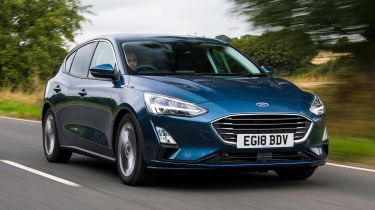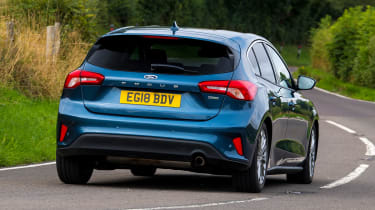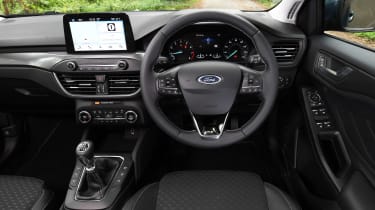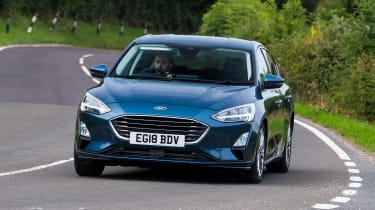New Ford Focus 1.0 Ecoboost review
We drive the all-new Ford Focus on British roads to see if the family car is back to its best

The latest Focus proves Ford is back to its best. It hits all the key family car requirements: it’s comfortable, spacious and well equipped. The fact the hatch is also the best driver’s car in its class is a bonus. It perhaps lacks that last degree of finesse and quality you’ll find in a Volkswagen Golf, but as an overall package it’s difficult to knock. Don’t be surprised to see the Focus flying out of UK showrooms yet again.
In the UK, the Focus is no less integral to Ford than a pilot is to a Boeing 747. The company shifted more examples of the family model alone in this country in 2017 than Volvo, Renault or Honda sold cars.
So when a new version comes along, there’s no room for error. If it’s not practical enough, families won’t take to it. If it’s not efficient enough, business buyers will shun it. And if it’s no good to drive, enthusiasts won’t give it a second look. Ahead of the fourth-generation Focus going on sale this month, we’ve driven the car in the UK for the first time.
And when Ford says the new Focus is all new, it really means it; no parts have been carried over from the previous car.
It’s based on a completely new platform, called C2, dressed in a sharp new suit and kitted out with the latest in-car tech and infotainment.
Used - available now

2022 Ford
Focus
15,007 milesManualPetrol1.0L
Cash £16,800
2022 Ford
Focus
25,596 milesManualPetrol1.0L
Cash £15,900
2020 Ford
Focus
21,749 milesManualPetrol1.0L
Cash £13,740
2022 Ford
Focus
32,109 milesManualPetrol1.0L
Cash £17,186Despite its popularity – it was the third best selling car in the UK last year – the Focus was beginning to lag behind its rivals in almost every respect. Ford is making bold claims about the latest model, calling it the best car in the company’s history.
Notice Ford says ‘best’ and not ‘prettiest’. Styling is subjective, of course, but we reckon the Focus is quite a spec-sensitive car. In Titanium X trim and finished in Chrome Blue (a £525 option) it’s a rather dowdy-looking thing, particularly on small 17-inch wheels, which get a bit lost under the curvy arches. ST-Line models (£1,250 less spec for spec) inject some visual appeal thanks to their sportier styling.
The cabin of the outgoing Focus was a real weak point; littered with buttons and fitted with clunky infotainment, it made an Amstrad computer look up to date. Thankfully, Ford has addressed that in the new model, with a slick, bright and responsive eight-inch touchscreen which controls the vast majority of the car’s functions. Happily, there are still buttons and dials below the display for the audio and climate controls.
It’s a shame Ford’s interior design budget didn’t extend to a new gearknob, which appears to have been plucked from the Mk1 Mondeo. The colour scheme in our test car is a bit drab, too. But be a little more adventurous with the spec and you’ll have yourself a clean, ergonomic and tasteful cabin.
As UK buyers continue to shun diesel, Ford predicts the bulk of sales will be made up of its 1.0-litre three-cylinder EcoBoost. It’s a brilliant motor and one we know well from the Fiesta; it comes in three states of tune (85bhp, 100bhp and 124bhp), and we’re testing the most powerful version here, paired with a six-speed manual gearbox.
It’s a smooth, refined, but thrummy little engine that is likely to serve up all the shove a family of four will ever need. Below 2,000rpm the engine is a little hesitant, but beyond this it spins cleanly to 6,500rpm. Ford says 0-62mph takes 10 seconds, which is perfectly adequate in this part of the market.
You can have an eight-speed auto box if you pay a further £1,330. This increases CO2 emissions from 111g/km to 128g/km and uses more fuel in the process: 49.6mpg vs 57.6mpg. We wouldn’t bother, because aside from a slightly long throw, the manual is weighty and tactile. The smooth clutch makes for easy progress, too.
Better than the powertrain is the chassis and steering response. The Focus now covers ground with a sense of composure and precision that was sorely missed from the previous model. It takes road imperfections and bumps in its stride, while the steering translates your every input accurately to the road to give the Focus a sense of athleticism. It comfortably regains its crown as the best car in its class to drive.
While the ride is largely smooth and controlled, it doesn’t quite have the plushness of a Volkswagen Golf; opting for the 1.0-litre engine means the Focus comes equipped with traditional torsion-beam rear suspension. The more powerful 1.5 or 2.0-litre models get more sophisticated independent rear suspension, which should go some way into giving the Focus that additional layer of comfort on the move.
More important for family buyers is practicality. The new C2 platform has allowed Ford to extend the wheelbase of the Focus by 53mm, while inside there are neat touches such as the raised front seats. This allows rear passengers to slide their feet beneath them, making better use of the space available.
There’s acres of head and knee room for adults in the back, and squeezing three across the rear bench is doable, although it will be a little tight. There are two ISOFIX points as standard, too. The boot is a decent size (375 litres), if not quite the largest in the class. Dropping the rear bench increases space to 1,354 litres, meaning it trumps the Golf for outright practicality.
Ford is still working on PCP prices, but early indicators show our 1.0 Titanium X will be around £225 per month with a £5,000 deposit. Which, coincidentally, is almost exactly how much it’ll cost for an equivalent Vauxhall Astra or Golf.











